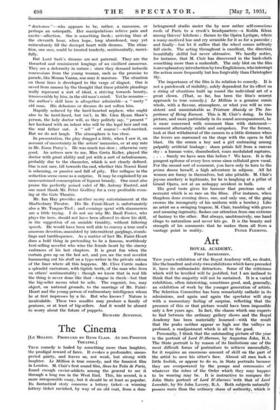The Cinema
[LE MILLION. PRODUCED BY RENE CLAIR. AT THE PHOENIX THEATRE.]
TRUE comedy is hailed by something more than laughter, the prodigal reward of farce. It evokes a profounder, unsus- pected gaiety, and leaves us, not weak, but strong with laughter. Le Million is true comedy, and the funniest film in London. M. Clair's first sound ffirn, Sous ks Toils de Paris, found enough caviar-addicts among the general to see it through a long run in the West End. This, his second, is a more irresponsible essay, but it should be at least as popular. Its fantastical story concerns a lottery ticket—a winning lottery ticket ravished, by way of an old coat, from a dun-
beleaguered studio under the by now rather self-conscious roofs of Paris to a crook's headquarters—a Kubla Khan among thieves' kitchens : thence to the Opera Lyrique, where a many-motived hue and cry scramble for it as for a pancake; and finally—but let it suffice that the wheel comes artlessly full circle. The acting throughout is excellent, the direction beautifully skilful but never obtrusive. We hardly notice, for instance, that M. Clair has discovered in the back-cloth something more than a makeshift. The only blot on the film is an explanatory introduction by two Englishmen, who interrupt the action more frequently but less forgivably than Christopher Sly.
The importance of the film is its relation to comedy. It is not a patchwork of risibility, solely dependent for its effect on a string of situations built up round the individual art of a great clown. (That, so far, has been the film's nearest approach to true comedy.) Le Million is a genuine comic whole, with a flavour, atmosphere, or what you will as con- sistent and unmistakable as Tristram Shandy or The Im- portance of Being Earnest. This is M. Clair's doing. In this picture, and more particularly in its sound accompaniment, he is more concerned with comment than with statement— comment alternately subtle and outspoken. For the former, look at that withdrawal of the camera to a little distance when the lovers are marooned on the stage with the opera in full blast. On the screen a boy and a girl embracing among palpably artificial boskage : sham petals fall from a canvas sky : a human voice, disembodied, roars modulated raptures. . . . . Surely we have seen this before ? We have. It is the pungent epitome of every love scene since celluloid grew vocal. For the second sort of comment, you have only to turn to the prima donna herself, a high adventure in adipose. All fat women are funny in themselves, but also pitiable. M. Clair's joyous mockery is legitimate, for he is laughing at a pillar of Grand Opera, not at an unhappy accident in bulk.
His good taste gives his humour that precious note of restraint which is so rare on the films. (For instance, when thugdom dons evening dress, one, and only one, of the gang crowns the incongruity of his uniform with a bowler.) Like an artist on a swinging trapeze, M. Clair, tumbling with grave and amusing ingenuity, flashes our attention from one extreme of fantasy to the other. But always, unobtrusively, one hand clings to naturalism and never lets go. It is the beauty and strength of his comments that he makes them all from a




































 Previous page
Previous page